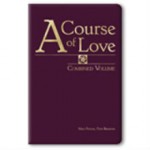 “We are about finding our heart and soul so that we can live them into existence in this world.”
“We are about finding our heart and soul so that we can live them into existence in this world.”
Slowly, slowly, I’m building up to a full contingent of Course of Love chapters done in audio. Re-doing some of the early ones, I noticed that in Chapter 4 we hear that love joins the world, (C:4.25) and in Chapter 7, that it is not the world that keeps us separate, but rather, we who keep ourselves separate from the world. (C:7.9) The ongoing message is that love joins (or does not join) the world . . . through us.
This has been emphasized in my life in these days following Christmas, days when everyone is exhausted. I have found many times that in the “let down” of exhaustion, love . . . happens: confidences are shared, quiet is enjoyed, the belovedness of the ordinary returns.
I live, in so many ways, an ordinary life. There have been times over the years that this has felt “all wrong,” times when my experiences made me judge my life and determine that it needed to be quite different than it was. But as the years have gone by, I am convinced that living the extraordinary within our ordinary lives is a perfect way of being for many of us. And I feel that part of my charge, is sharing in a way that helps more people to see that they also do this, often without recognizing it or its value.
I mention it, because in that “end of the year” way, I’ve been thinking about what I have to  share. What my life—in its context—with all its ordinariness and extraordinariness has to say. With A Course of Love Combined Volume finding new readers and increased interest, you can maybe imagine that this has been a subject lying in wait in the background of my life, in those subconscious reaches that call us to explore them when the time is right.
share. What my life—in its context—with all its ordinariness and extraordinariness has to say. With A Course of Love Combined Volume finding new readers and increased interest, you can maybe imagine that this has been a subject lying in wait in the background of my life, in those subconscious reaches that call us to explore them when the time is right.
If there is one thing I am passionate about, it is moving away from teaching and learning, but not only as a method. I am passionate about the return of wholeness to our lives. Throughout time we have heard not only of the “teachings” of Jesus, but are asked to consider: what is the message of Jesus’ life? We hear of the star under which he was born, the prophets who announced his coming. At Christmas we hear of his lineage in a series of fourteen generations. We are given historical context. And then we begin to hear of events. After Jesus is Baptized and identified as “who he is;” after he accepts “who he is,” he begins to live the life that “who he is” has anticipated. I believe that what Jesus calls us to is like this. In our own lives, we too can find the pointers that identify “who we are” and what is ours to do. I do not know how to describe this finding in my own life. It is indescribable perhaps. Yet it is a movement of the heart that leads, as is said in The Dialogues, to conviction.
As so often happens when I’m moved to strong feelings, I find something that is so relateable and so much more beautifully said than I can say it, that I have to share. James Hillman speaks of what happens in the movement away from mind and ego, and says that as consciousness becomes “broader and more feminine in its receptivity and self-intimacy, the flesh as well transforms into body consciousness.” He calls body consciousness “the actual incarnation of our humanity in warmth and joy and ease and rhythm and being present here and now, physically close to ourselves . . . and to others. Out of the stable of one’s own hunted and exhausted flesh, one’s own rejected physical self, asinine and dumb as an ox, the new body is born and then come the kings bringing gifts.”
Why does this movement, this momentum, this build-up to finding the sacred and significant in our own lives feel peculiar? Because it is divergent from the trajectory of the past. It says our experience here is more valuable than we know. It means that we are about finding our heart and soul so that we can live them into existence in this world. This experience is intangible, yes. It is that way. But it is available here and now . . . and the kings and queens still arrive bearing gifts.
(Hillman quote taken from, Insearch: Psychology and Religion, p. 122)


Hello Anne,
What has happened to you happens to me every once in a while — where my heart “knows” that I have found something that it has been waiting for. I am so glad to hear this from you. You express yourself in a very lovely way and I hope you will keep in touch as you begin to experience A Course of Love.
Dear Mari!
(writing to you from Sweden, early morning)
Yesterday I heard about this book and when I read about it a little bit more it just felt so good. ACIM has been my greatest Spiritual inspiration for nearly 30 years.
Now I feel so happy that there is a continuation that seems to be just what I have been longing for… Since I have not read it yet I do not know exactly the message, but as far as I understand it is about to really live our life through love in this bodys and on this earth and through our hearts…letting the mind rest more and more and just be the love… And that we do not have to understand so much in our mind. Our heart knows.
The last year i have gone through a deep challenge in my life. I feel now that in some ways it has lead me deeper into my heart and as you describe it, to rest my mind a bit more which also helps me to be more open and connect with others from a more loving place inside.
I have also arranged retreats for women the last years and whenever I have used inspiration from ACIM I often I have change the word “he” to “she” because it has felt better and more true when we are only women, so I felt so happy to hear that in A Course in love there is both he and She…
There were much more things that felt really good when I read about ACOL and that mirrored my own path and where I am now on my spiritual journey. So I am looking forward very much to read the book.
Thankyou so much for doing this work which I already feel will strenghen and inspire me on my journey. And as you said it feels good that you are a person living an ordinary life just like the most of us.
Love from Anne Solveig in Sweden.
Dear Jacques,
I am so touched by this beautiful reply. I just wrote today’s post on “rest.” What you say is so true, and as I have explored the idea of rest, I am certain it is part of the way of the heart. It’s easy to see the connection just in being done with efforting. But true rest is more than that. We can think there is no value in rest, but it is precious to us. There are so many beautiful descriptions of rest in A Course of Love. Here is one for you:
D:D5:20
Remember that you are tired of learning. You are tired here, after your climb. You simply want to rest and have whatever transformation is to come to you to come. If you could indeed give in to this desire fully, it would speed the transformation along quite nicely. So please, listen to your weariness and to your heart’s desire to rest. Listen to the call to peace and let yourself recline in the embrace of love, feeling the warm earth beneath you and the heat of the sun above you. Let languor enfold you and apply no effort to what you read here. Just accept what is given.
I have also noticed that when we are very tired o sick or sick and tired , after the initial phase of rebellion, we seem to become more receptive, we reach abandonment. And it is here that we can be reached. The body and the mind let go of their usual resistance and the heart with it’s tenderness can be heard.
Even if this type of abandonment by exhaustion is not necessary, it does happen. It opens new perspectives, and although we may be quick to revert to the old habits of fighting, we have discovered something else. Moments of grace not always recognized, and usually fought in our victory oriented culture. This defeat of the ego, at least temporarily, is a step in the right direction. We may discover that the strong one is not the one we thought it was.
Love,